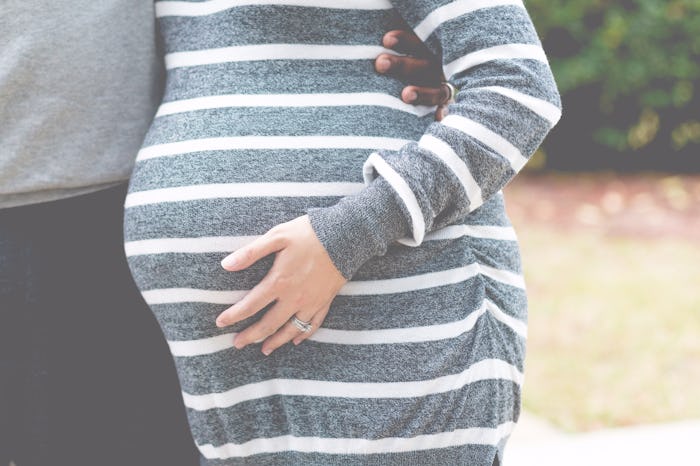Apparently, when a woman reaches a certain age, her vagina and all things related to it are considered old. They are seen as ancient dinosaur fossils with cobwebs growing on them, and are the dreaded b-word — barren. At least, that's the message being sent. Sarcasm aside, there is a real problem with calling a woman's pregnancy "geriatric" because in most cases she and her uterus are not geriatric. There are plenty of reasons "geriatric pregnancy" is a harmful term, and most of them have to do with the fact that the term is so extreme and not representative of what the woman is going through at all.
According to Healthline, geriatric pregnancy is considered any pregnancy that occurs after the age of 35. You could be pregnant in your mid to late 30s and considered to be having a geriatric pregnancy. It sounds really bizarre. I'm in my early 30s. I'll admit to having a little back pain here and there, and maybe I can't recover from a hangover as easily as I used to, but if I were to get pregnant in a few years it would be called "geriatric?"
The term "geriatric pregnancy" doesn't make sense especially when Merriam-Webster dictionary defines geriatric as an aged person. The American Academy of Family Physicians refers to geriatric as the care of a person over 65 years old. Surely not everyone who is 65 feels or considers themselves to be geriatric, but that's generally the baseline age for geriatric care. So why in the world would anyone tell a pregnant woman who is age 35 and older that she is having a geriatric pregnancy, when in all other scenarios 65 is considered the golden age of geriatrics? It's befuddling.
Thankfully the term "advanced maternal age" has come onto the scene and is replacing "geriatric pregnancy" little by little. Although to be honest, I'm not sure it's much better than the latter. Even so, the geriatric pregnancy phrase still gets tossed around and here are five reasons we should stop using it entirely.
1It Shames Women Who Have Kids Later
And by later, I mean later than 35 years old. It's absurd when you think about it considering that, as of 2014, the average age of first-time mothers in the U.S. was 26.3, that was up from 24.9 in 2000, according to a report by the National Center for Health Statistics. Researchers claim the uptick is due to women waiting longer to have children.
"The term geriatric pregnancy is associated with the stigma that this is not normal and that there will be problems," Dr. David Jaspan, chair of the Department of Obstetrics and Gynecology for Einstein Healthcare Network, tells Romper. "People make choices about their family planning and we, as the medical community, should be respectful of such decisions and work with each individual to best promote their well-being."
2The Term Makes Women Feel Like Sh*t
People who are actually considered geriatric via their age don't even like the term geriatric. My great aunt is in her 70s and rolls her eyes when she tells me she has to go to a "geriatric doctor." She feels young at heart and is super active.
Understandably, many women in their 30s or 40s would hate the term too mainly because they are, in fact, young. It's not like they're having babies in nursing homes. Pregnant women have enough on their plate without the added put downs of the medical community (and others) referring to their pregnancy as geriatric.
3It Gives Women Anxiety About Their Pregnancies
According to the American College Of Obstetricians and Gynecologists there are some additional risks for pregnant women who are over 35 years of age: the chances of a pre-existing condition that could cause complications for mother or baby, chromosomal defects in babies, high blood pressure, diabetes, premature births, and stillborn.
Most women who are pregnant later in life already know the risks, because they've been bombarded with this information their whole adult life. Many of them are already terrified that things could go wrong. Calling it geriatric certainly isn't going to make things easier, if anything it makes the mother more stressed.
4The Phrase Implies Physically Unfit
According to Everyday Health, a person would seek geriatric care when they are considered seniors and wish to prevent or treat a disability or disease in old age. Referring to pregnancies among women who are cooking a baby after the so-called culturally appropriate age implies there is an underlying physical issue. It implies the mother's body isn't fit or optimally performing to carry a baby. In reality, a 35-year-old pregnant woman, or a 48-year-old pregnant woman could be healthier than a 24-year-old pregnant woman.
5It's Unsupportive Of Women And Mothers
There is a clear shift in the maternal age of women having babies. Many are waiting to have children so that they can establish careers and solid partnerships (not that you necessarily have to do either of these things to have children). New attitudes surrounding social norms and maternal age are becoming more mainstream. Antiquated beliefs about how a family should be formed are slowly being ditched. Telling a pregnant woman over 35 that she has a "geriatric pregnancy" is in a way, reaffirming those toxic platitudes and old notions that just don't really fit for many modern women. Furthermore, it's really unsupportive.
All women should be supported in their choice to have, or not to have, children. It also is worth noting that some women don't actually even have a "choice" when planning a family. Some women have medical conditions that greatly reduce their chances of getting pregnant. Some women want to wait until they meet the "right person," but sometimes their right person doesn't come until later in their 30s and 40s. Regardless of the situation, "geriatric pregnancy" is a term that should be thrown out the window, once and for all.
